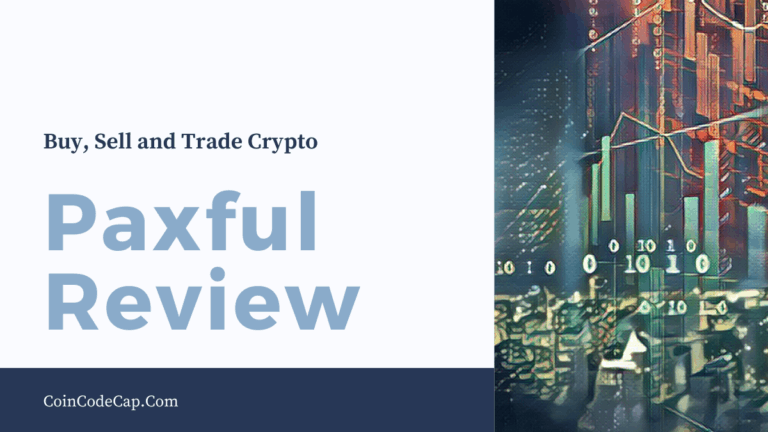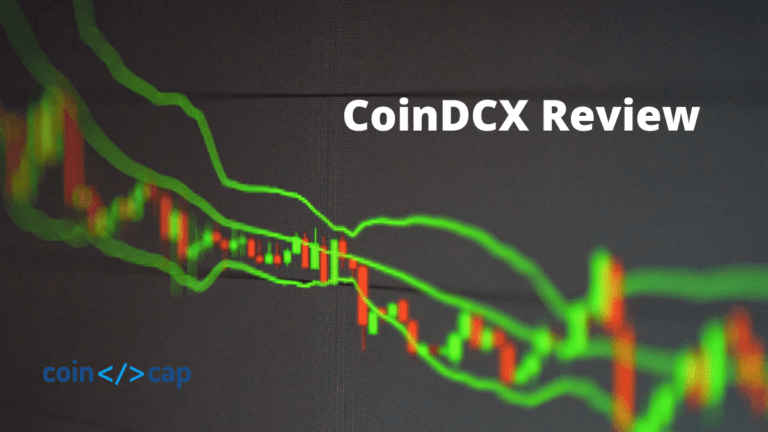OKX is a platform where investors can buy, trade, and earn Bitcoin, Ethereum, and other cryptocurrencies. It offers spot, margin, and derivatives markets, as well as a variety of crypto products and services.
However, OKX is not the only option for crypto enthusiasts who want to explore the world of digital assets.
In this article, we will review some of the best OKX alternatives for crypto trading in 2023, based on their features, pros and cons, and user reviews.
Table of Contents
Summary
| Platform | Fees | Liquidity | Security | Token Selection | Fiat Options | KYC Requirements |
|---|---|---|---|---|---|---|
| BydFi | Low | Medium | Medium | Limited | Yes | Yes |
| Pionex | Low | High | High | Medium | Few | Yes |
| Binance | Low | High | High | High | Few | Yes |
| KuCoin | Low | High | High | Medium | Few | Yes |
| Coinbase | High | High | High | Low | Many | Yes |
BydFi
BydFi is a decentralized exchange (DEX) that runs on the Binance Smart Chain (BSC). It allows users to swap, lend, borrow, and farm any BSC-based tokens with low fees and high speed. BydFi also has a native token called BYD, which can be used to govern the platform and earn rewards.
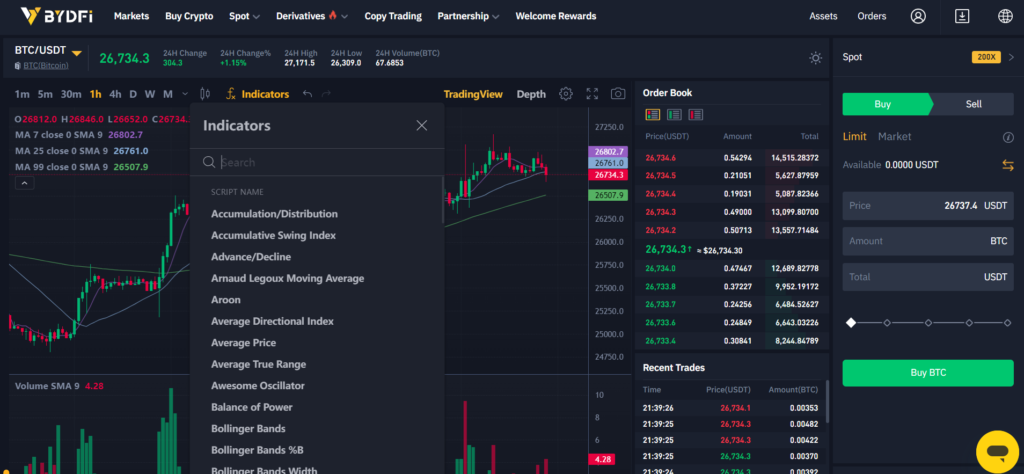
Some of the features of BydFi are:
- Automated Market Maker (AMM): BydFi uses an AMM model to provide liquidity and price discovery for any pair of tokens on BSC.
- Leveraged Tokens: Bydfi have the largest range of leveraged tokens in the world. This is where users can trade the price changes of different coins and tokens with leverage, but without margin. This means that people can engage in a x3 leveraged token for coins like BTC, ETH, and a range of altcoins, without putting up their own finances to secure the trade. This makes them safer and less daunting to newcomers.
- Perpetual Contracts: BydFi offers USDT perpetuals, it offers 103 distinct pairs and provides up to 200x leverage.
Some of the pros of BydFi are:
- Low Fees: BydFi charges only 0.2% trading fee, which is lower than most centralized exchanges (CEXs) and DEXs.
- High Speed: BydFi leverages the fast and scalable crypto networks, which can process more than 200 transactions per second (TPS).
- User-Friendly Interface: BydFi has a simple and intuitive interface that is easy to access and use the platform.
- Copy Trading Protocol: BYDFi assists users with this process through its integrated copy trading functionality. Users can easily peruse a growing catalog of high-performing members on the platform.
Some of the cons of BydFi are:
- Limited Token Selection: BydFi has support for a variety of tokens. However, it somewhat falls short when compared to rivals.
- No NFT and Staking: BydFi is a relatively new project and does not offer crypto staking and nft features.
Pionex
Pionex is a CEX that integrates crypto trading bots and artificial intelligence (AI) to help users automate their trading strategies. It supports over 100 trading pairs across spot and futures markets, as well as margin trading and lending services.
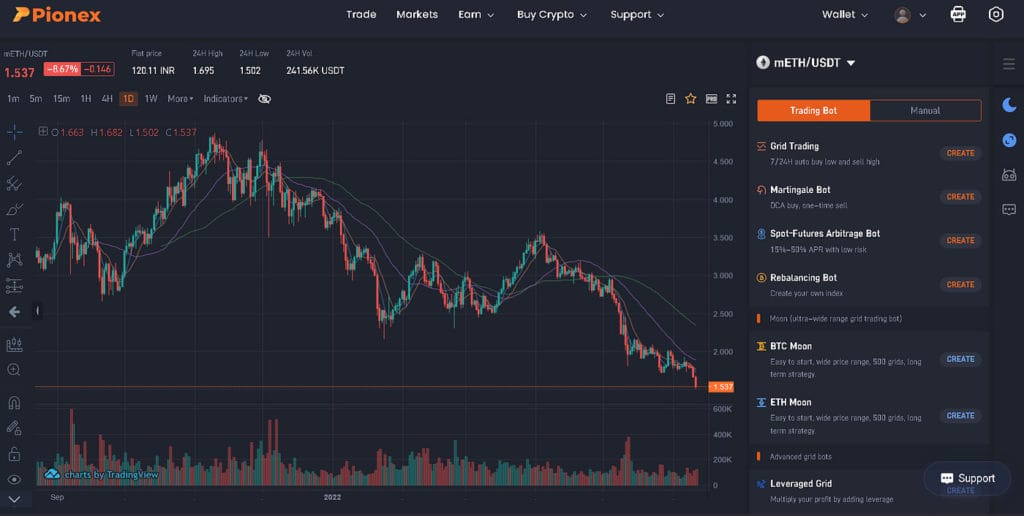
Some of the features of Pionex are:
- Trading Bots: Pionex offers 16 types of trading bots that can execute various strategies such as grid trading, arbitrage trading, trend trading, and more. Users can customize their bots’ parameters or use the recommended settings by Pionex.
- AI Advisor: Pionex has an AI advisor that can analyze the market conditions and suggest the best trading bot for each user based on their risk appetite and preferences.
- Liquidity Aggregator: Pionex aggregates liquidity from multiple sources such as Binance, Huobi, OKEx, and Bitfinex to provide deep order books and competitive prices for its users.
- Social Trading: Pionex allows users to follow and copy the trades of other traders registered on the platform. Users can also share their trading performance and insights with the community.
Some of the pros of Pionex are:
- Low Fees: Pionex charges only 0.05% trading fee, which is one of the lowest in the industry. Users can also enjoy zero fees for deposits and withdrawals.
- High Security: Pionex is licensed and regulated by the Monetary Authority of Singapore (MAS) and complies with strict security standards. It also stores 99% of its funds in cold wallets and uses multi-signature technology to prevent unauthorized access.
- Easy to Use: Pionex has a user-friendly interface that makes it easy for anyone to start using trading bots and AI. Users can also access Pionex through its mobile app or web browser.
Some of the cons of Pionex are:
- Limited Fiat Options: Pionex only supports a few fiat currencies such as USD, EUR, GBP, and SGD. Users who want to use other fiat currencies have to convert them to crypto first before using Pionex.
- KYC Requirements: Pionex requires users to complete a Know Your Customer (KYC) verification process before they can use the platform. This may take some time and affect the privacy of some users.
Binance
Binance is the largest and most popular CEX in the world in terms of crypto volume. It supports over 500 trading pairs across spot trading, margin, futures, and options markets, as well as a variety of crypto products and services such as staking, lending, mining, and more. Binance also has a native token called Binance Coin (BNB) that is used to pay fees, participate in token sales, and access exclusive features.
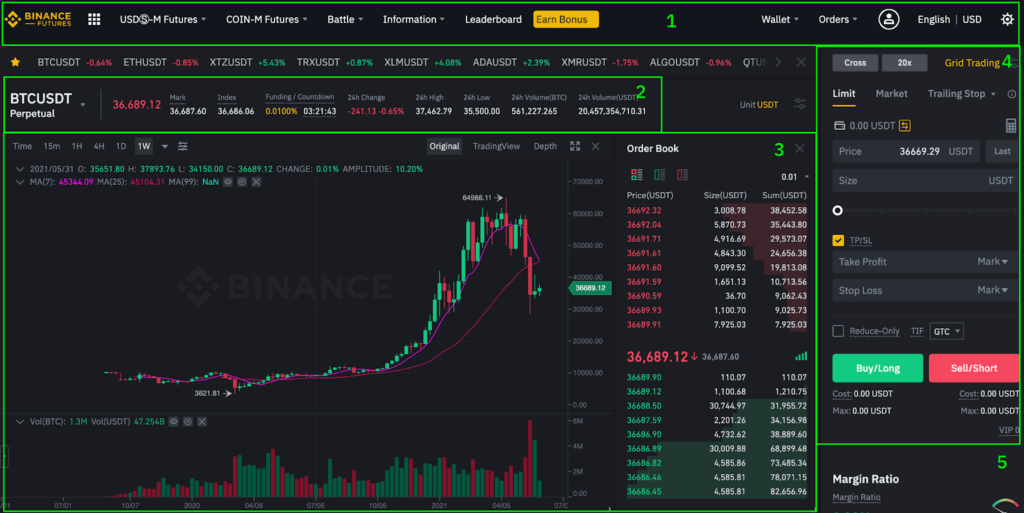
Some of the features of Binance are:
- Binance Smart Chain (BSC): BSC is a parallel blockchain to Binance Chain that enables smart contracts and decentralized applications (DApps) on Binance. It is compatible with Ethereum and supports various DeFi and NFT projects.
- Binance Earn: Binance Earn is a platform that allows users to earn passive income from their crypto assets. It offers various products such as savings, staking, liquidity mining, launchpool, and more.
- Binance Academy: Binance Academy is an educational platform that provides free and comprehensive resources on blockchain and cryptocurrency topics. It covers various levels from beginner to advanced and offers articles, videos, quizzes, and glossaries.
- Binance Charity: Binance Charity is a non-profit organization that uses blockchain technology to empower social good. It supports various causes such as education, health, environment, and disaster relief.
Some of the pros of Binance are:
- High Liquidity: Binance has the highest liquidity in the crypto market, which means that users can easily buy and sell any token at the best price and with minimal slippage.
- Low Fees: Binance charges only 0.1% trading fee, which can be further reduced by using BNB or holding VIP levels. Users can also enjoy zero fees for deposits and withdrawals for some tokens.
- High Security: Binance uses advanced security measures such as 2-factor authentication (2FA), anti-phishing code, address whitelisting, and withdrawal confirmation to protect its users’ funds and accounts. It also has a Secure Asset Fund for Users (SAFU) that acts as an insurance fund in case of any security breach.
- Customer Support: Binance provides 24/7 customer support via live chat, email, phone, and social media. Users can also find answers to their questions on the Binance website and help center.
Some of the cons of Binance are:
- Regulatory Uncertainty: Binance faces regulatory challenges in some countries such as the United States, United Kingdom, Japan, and Germany. Users in these regions may have limited access to some features or services on Binance or have to use a separate platform such as Binance.US or Binance.UK.
- Complex Interface: Binance has a complex interface that may overwhelm some users who are not familiar with crypto trading. Users may have to navigate through multiple tabs and menus to find what they need.
KuCoin
KuCoin is a CEX that aims to provide a simple and secure platform for crypto trading. It supports over 300 trading pairs across spot and futures markets, as well as margin trading and lending services.
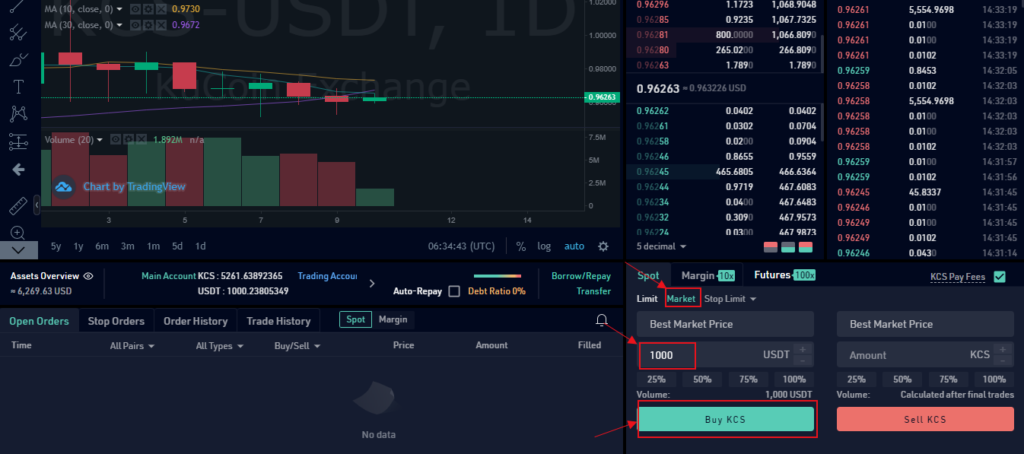
Some of the features of KuCoin are:
- KuCoin Trading Bot: KuCoin Trading Bot is a feature that allows users to automate their trading strategies using AI algorithms. Users can choose from three types of bots: classic grid trading bot, DCA bot, and infinity grid bot.
- KuCoin Lend: KuCoin Lend is a platform that allows users to lend their idle assets and earn interest, or borrow any supported tokens with low interest rates.
- KuCoin Pool-X: KuCoin Pool-X is a platform that combines staking and liquidity mining. Users can stake their tokens and earn rewards from both the staking pool and the liquidity pool.
- KuCoin Community Chain (KCC): KCC is a public blockchain that is compatible with Ethereum and supports smart contracts and DApps. It is powered by KCS and aims to provide fast, secure, and low-cost transactions for KuCoin users.
Some of the pros of KuCoin are:
Low Fees: KuCoin charges only 0.1% trading fee, which can be further reduced by using KCS or holding VIP levels. Users can also enjoy zero fees for deposits and withdrawals for some tokens.
- High Security: KuCoin uses multiple security layers such as 2FA, SMS verification, anti-phishing code, and withdrawal confirmation to protect its users’ funds and accounts. It also has a risk control system that monitors the platform’s operation and detects any abnormal activities.
- Easy to Use: KuCoin has a simple and user-friendly interface that makes it easy for anyone to start trading crypto. Users can also access KuCoin through its mobile app or web browser.
- Customer Support: KuCoin provides 24/7 customer support via live chat, email, phone, and social media. Users can also find answers to their questions on the KuCoin website and help center.
Some of the cons of KuCoin are:
- Limited Fiat Options: KuCoin only supports a few fiat currencies such as USD, EUR, GBP, and AUD. Users who want to use other fiat currencies have to convert them to crypto first before using KuCoin.
- KYC Requirements: KuCoin requires users to complete a KYC verification process before they can use the platform. This may take some time and affect the privacy of some users.
Coinbase
Coinbase is one of the oldest and most trusted CEXs in the world. It supports over 100 trading pairs across spot and Coinbase Pro markets, as well as a variety of crypto products and services such as staking, lending, earning, and more. Coinbase also has a native token called Coinbase Token (CBT), which can be used to pay fees, participate in token sales, and access exclusive features.
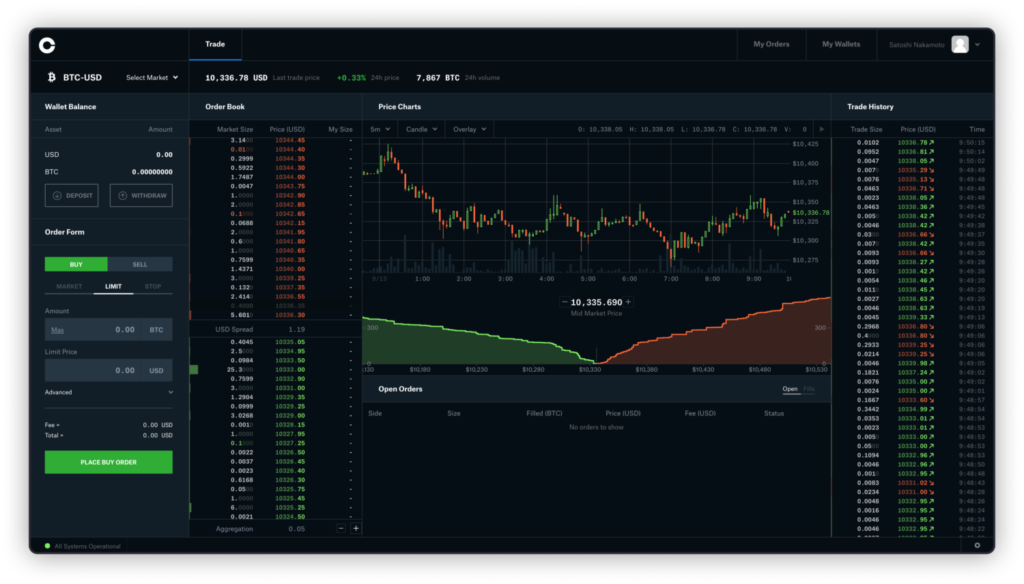
Some of the features of Coinbase are:
- Coinbase Wallet: Coinbase Wallet is a mobile app that allows users to store, send, and receive any ERC-20 tokens and NFTs on Ethereum. It also supports various DApps and DeFi protocols on the Ethereum network.
- Coinbase Earn: Coinbase Earn is a platform that allows users to learn about different cryptocurrencies and earn them for free by completing simple tasks such as watching videos, taking quizzes, or inviting friends.
- Coinbase Card: Coinbase Card is a debit card that allows users to spend their crypto balance anywhere that accepts Visa. Users can also earn up to 4% cashback in crypto for every purchase they make with the card.
- Coinbase Ventures: Coinbase Ventures is an investment arm of Coinbase that supports early-stage startups in the crypto space. It has invested in over 100 projects such as Compound, Uniswap, Chainlink, and more.
Some of the pros of Coinbase are:
- High Reputation: Coinbase is one of the most reputable and regulated CEXs in the world. It has over 68 million verified users and operates in over 100 countries. It also complies with strict security standards and legal requirements in each jurisdiction.
- High Liquidity: Coinbase has high liquidity in the crypto market, which means that users can easily buy and sell any token at the best price and with minimal slippage.
- High Security: Coinbase uses advanced security measures such as 2FA, biometric authentication, encrypted data storage, and offline backups to protect its users’ funds and accounts. It also stores 98% of its funds in cold wallets and has an insurance policy that covers up to $250,000 per user in case of any security breach.
- Customer Support: Coinbase provides 24/7 customer support via live chat, email, phone, and social media. Users can also find answers to their questions on the Coinbase website and help center.
Some of the cons of Coinbase are:
- High Fees: Coinbase charges relatively high fees compared to other CEXs. It charges up to 4% for buying or selling crypto with fiat currencies, up to 0.5% for trading on Coinbase Pro, and up to 3% for using Coinbase Card.
- Limited Token Selection: Coinbase only supports a limited number of tokens compared to other CEXs. It currently supports over 100 tokens.
Conclusion
OKX is a great platform for crypto trading, but it is not the only one. There are many other OKX alternatives that offer different features, pros and cons, and user experiences. Depending on your needs and preferences, you may find one or more of these platforms suitable for you.
We hope this article has helped you find the best OKX alternative for you.
For on-demand analysis of any cryptocurrency, join our Telegram channel.

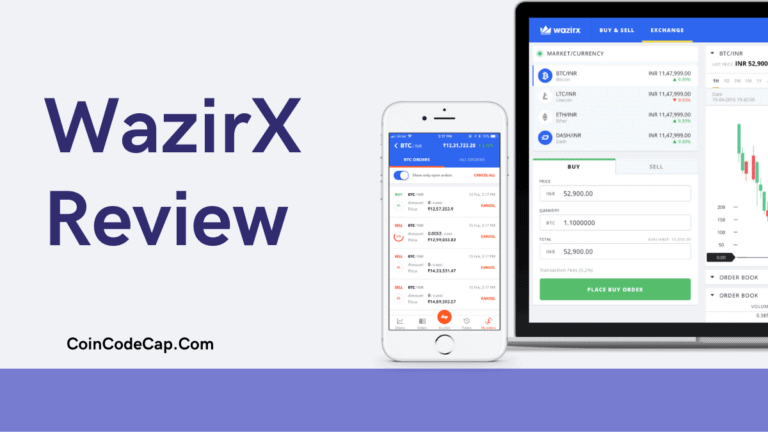
![Crypto.com Review| Lending, Staking, Trading [Must Read] 12 Crypto.com Review](https://coincodecap.com/wp-content/uploads/2021/03/Crypto.com-review-768x432.png)
